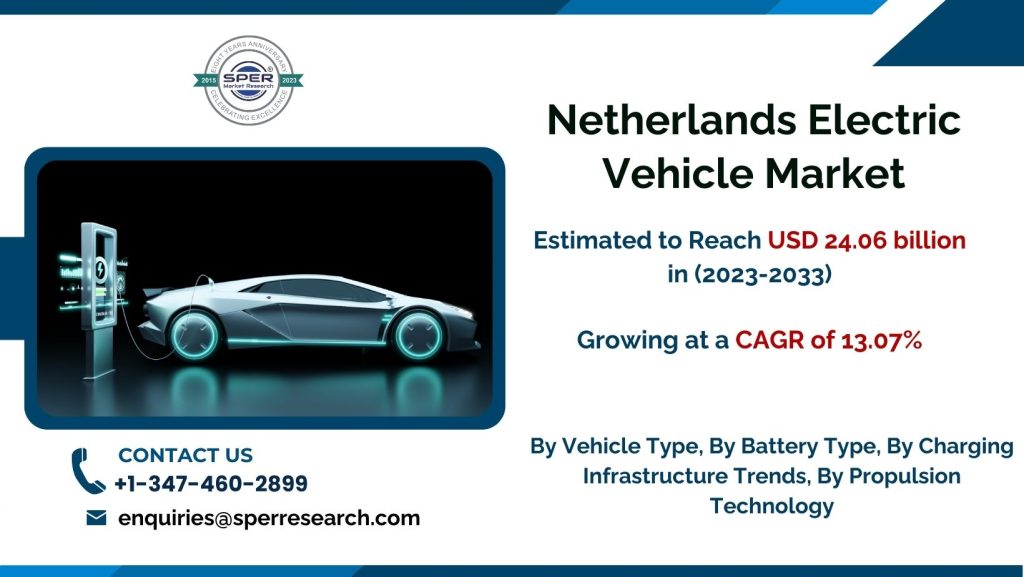Netherlands Electric Vehicle Market Growth, Share, Size, Revenue, Upcoming Trends, Challenges, Key Manufactures and Competitive Analysis 2033: SPER Market Research

An electric car, in contrast to a gasoline-powered vehicle, runs on electricity. These cars are powered by an electric motor rather than an internal combustion engine, which needs a steady supply of power from batteries to run. These vehicles employ different kinds of batteries. These comprise molten salt, zinc-air, lithium ion, and other nickel-based systems. There are various charging levels available for EVs, including level 1, level 2, and level 3. Higher charge levels result in faster charging and more power delivery to the car in comparison to conventional cars, it has superior fuel efficiency, lower carbon emissions, less maintenance requirements, easier at-home charging, smoother driving, and quieter engines. Batteries, hybrid, and plug-in hybrid electric vehicles are the three categories of electric vehicles.
According to SPER market research, ‘Netherlands Electric Vehicle Market Size- By Vehicle Type, By Battery Type, By Charging Infrastructure Trends, By Propulsion Technology- Regional Outlook, Competitive Strategies and Segment Forecast to 2033’ state that the Netherlands Electric Vehicle Market is predicted to reach USD 24.06 billion by 2033 with a CAGR of 13.07%.
The Netherlands Electric Vehicle Market is anticipated to expand quickly over the course of the forecast period due to expanding e-vehicle charging infrastructure, government restrictions, and rising car emissions. The government provides a range of subsidies for the removal of emission-causing passenger cars and the setup of charging stations, which propels the Dutch market for electric vehicles. The passenger car category is expected to experience substantial growth in the Netherlands EV market throughout the forecast period. In response to consumer demand and environmental rules, automakers are rapidly expanding their range of electric vehicle options. The performance and affordability of EVs are increasing due to advancements in battery technology. The goal of innovations like higher energy density and solid-state batteries is to reduce range anxiety.
Concerns about high installation costs and the lack of incentives may impede the growth of the EV charging industry. The high initial cost of level 3 and ultra-fast chargers is a major barrier to the industry’s growth. Although level 1 and level 2 chargers typically require 6 to 16 hours to fully charge, customers are used to refuelling traditional automobiles in 5 to 7 minutes. Fast chargers that can fully recharge EVs in less than 30 minutes are therefore in high demand. But the upfront costs of level 3 charging stations may discourage people from switching to electric vehicles.
Request For Free Sample Report @ https://www.sperresearch.com/report-store/netherlands-electric-vehicle-market.aspx?sample=1
Impact of COVID-19 on Netherlands Electric Vehicle Market
The COVID-19 had a significant impact on mobility patterns and charging requirements, which in turn affected the demand for infrastructure for charging electric vehicles. There was a significant decrease in the demand for charging. Curfews have an impact on when charging sessions begin during grid usage peak hours. During lockdown periods, professional taxi drivers’ charging demands were significantly decreased and commuter-specific infrastructure was used less frequently. After the lockdown was released, the number of charging sessions and energy charged slowly increased, but this was primarily due to the introduction of a large number of new EVs to the market.
Netherlands Electric Vehicle Market Key Players:
The market for EVs in the Western Netherlands, which includes Amsterdam, Rotterdam, and Hague, accounts for a major share of the Netherlands’ EV market. This is due to the fact that there are numerous subsidies available for EV purchases, which will increase the EV market in the Netherlands. Additionally, some of the key market players are Audi AG, BMW AG, Ebretti Pty Limited, Mitsubishi Motors Corp., Renault Group, and others.
For More Information, refer to below link:-
Netherlands E-Vehicle Market Scope
Related Reports:
Follow Us –
LinkedIn | Instagram | Facebook | Twitter
Contact Us:
Sara Lopes, Business Consultant – USA
SPER Market Research
+1-347-460-2899





